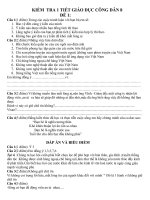Individual essay phạm thị minh thư AEn T321WSB 06 WSU21000116
Bạn đang xem bản rút gọn của tài liệu. Xem và tải ngay bản đầy đủ của tài liệu tại đây (111.62 KB, 7 trang )
SCHOOL OF WESTERN SYDNEY UNIVERSITY
ASSIGNMENT COVER SHEET
STUDENT DETAILS
Student
name:
Phạm Thị Minh Thư
UNIT AND TUTORIAL DETAILS
Unit
name:
Academic English
Tutorial group:
Lecturer or Tutor
name:
Student ID
number:
Unit
number:
Tutorial day and
time:
WSU21000116
AEn-T321WSB-06
Gabriel C. Ryan
ASSIGNMENT DETAILS
Individual Essay – “Discuss about the advantages and disadvantages of paying for an
Title:
employee’s professional training.”
Length
Due
Date
:
1216 words
date:
02/01/2022
submitted:
02/01/2022
Home campus (where you are
enrolled):
DECLARATION
X
I hold a copy of this assignment if the original is lost or damaged.
X
I hereby certify that no part of this assignment or product has been copied from any other
student’s work or from any other source except where due acknowledgement is made in the
assignment.
X
I hereby certify that no part of this assignment or product has been submitted by me in
another (previous or current) assessment, except where appropriately referenced, and
with prior permission from the Lecturer / Tutor / Unit Coordinator for this unit.
X
No part of the assignment/product has been written/produced for me by any other
person except where collaboration has been authorised by the Lecturer / Tutor /Unit
Coordinator concerned.
[AEN-T321WSB-06]_[PHẠM THỊ MINH THƯ]_[WSU21000116]
1
X
I am aware that this work will be reproduced and submitted to plagiarism detection software
programs for the purpose of detecting possible plagiarism (which may retain a copy on
its database for future plagiarism checking).
Student’s
signature:
Phạm Thị Minh Thư
Note: An examiner or lecturer / tutor has the right to not mark this assignment if the above
declaration has not been signed.
[AEN-T321WSB-06]_[PHẠM THỊ MINH THƯ]_[WSU21000116]
2
Accelerated industrial development is evident in today's modern society and human resources are
the factor that create competition between these different industries of the economy. According
to Olanyian & Ojo (2008), the most valuable assets of any organization are the human resources;
with the materials, machines and even the money, nothing will be done without man-power.
Nevertheless, the knowledge such as the ability, the skill, and the awareness that every individual
must acquire in order to operate effectively and productively. throughout the workers’ career,
they will most likely meet situations in which need to learn or adapt to their job. Workplace
training allows employees to gain the skills to perform their responsibilities while also
contributing to the organization. Training can take many forms, depending upon the requirements
and targets of the organization. Therefore, all employees must be trained in order to improve
their job skills. However, employees training has both advantages and disadvantages for the
company in general and the staff in particular. This article aim is to discuss some aspects of an
employee’s professional training such as their importance, the benefits and drawbacks, and so on.
Employees’ training is a form of training the organization's current employees in order to
improve the effectiveness as well as the company's profitability. Every position will require some
level of staff development, and training is typically provided at the beginning of new
subordinates' occupations. It is necessary to train employees in their knowledge and skills
required to meet business objectives. Training refers to the process of providing workers with the
information and skills needed to function within the standards and requirements company’s
internal. (Sommerville, 2007). In workplace, training is necessary and employees don't have a
firm grasp on their obligations or duties without it. Employee training refers to programs that
provide information, new skills, or opportunity for professional development to employees
[AEN-T321WSB-06]_[PHẠM THỊ MINH THƯ]_[WSU21000116]
3
(Elnaga & Imran, 2013). The best from employees can be elicited with the help of training, and
they can be managed to make even more successful. Job satisfaction is achieved in this manner,
and employees are also retained, avoiding the need for recruitment. There are many companies,
for example, where the training programs are available for every department to enhance
efficiency. Individual training requirements have become increasingly important for businesses.
Staff training is an important component as well as a vital part of Human Resource Management
and Development; it is the critical path to motivating workers and increase organizational
productivity (Mcclelland, 2002). In brief, employees’ professional training is importance because
not only it expands skills and allows workers to work more effectively but also the organizations
are developed in the increasingly competitive working environment.
The main point is that employees’ professional training also has advantages and disadvantages
for individuals and businesses because every job will involve some diferent level of staff training
and development. Staff training will raise the level and quality of their work. It provides them
with new skills and widen their knowledge, allowing them to produce higher performances. The
new skills can simply improve their current ones to help them do a better job: these can be minor
things like gaining a better understanding of services or products. Rodriguez & Walters (2017)
stated that employees will be capable of assisting the organization in achieving its competitive
posture in today's global market with appropriate training and development opportunities, as well
as successful employee performance assessment approaches. Staff training will enable them to
become more self-sufficient in the workplace. As a result, managers and other employees will
have more time on their hands. Of course, this will increase overall productivity, implying that
more work will be produced. External training is not always necessary; internal training can be
[AEN-T321WSB-06]_[PHẠM THỊ MINH THƯ]_[WSU21000116]
4
just as effective, if not more so. This will not only show the trainees how to complete a task in
the manner preferred by the company, but it will also aid in the development of positive team
relationships. Training entails a lot of teamwork and one-on-one time with coworkers, which is a
great way to learn how to work and get to know your coworkers. A joyful team that gets along
will create a fantastic working atmosphere. Training your employees will increase their
motivation to do an excellent work. They will feel appreciated and valued because you took the
time to train and improve their skills. Accidents occur frequently in the absence of organized
training and guidance, particularly among employees who work in hazardous environments;
training can assist organizations in preventing accidents. In short, personal characteristics and
professional abilities will improve as a result of effective training. Staff training benefits not only
staff, management, and agencies; it also benefits customers and guests because they receive highquality products and services.
In addition to the aspects that bring benefits to the business, there are also negative impacts on
the business. Training employees takes a long time and this time is typically taken from a
working day, which may have an impact on work and productivity levels. Work progress may be
hampered depending on the number of people being trained. If the workers are training an entire
team for an entire day, this is a complete loss of business for that day. This can be extremely
costly to the company, both financially and in terms of productivity. Although in-house training
is frequently provided for free, diverse skills and knowledge is occasionally required, which
often comes at the expense. External training programmes and specialized training can be
expensive, and even if the training is worthwhile, the company may not have the budget to
accommodate it. According to Miller (2014), companies typically spend $1,208 per worker on
[AEN-T321WSB-06]_[PHẠM THỊ MINH THƯ]_[WSU21000116]
5
terms of training and advancement. That cost is higher for an organization with 500 employees,
with the average totaling $1,888 per employee. Not only is money invested, but each company
spends nearly 31.5 hours on an individual on average to support oneself acquire the skills needs
of the organization. If the enterprise does not know how to optimize, the cost of training
employees in the business will be high, which will have a negative impact on the company. The
cost of training isn't the only financial concern. When workers gain qualifications and promote in
their positions by advancing their skills, they regularly expect compensation in the form of an
increase in salary. While this may be something the company is unable to do due to financial
constraints, it is possible that professionals will leave to work for another company after
inheriting the skills from their previous company.
While there are numerous benefits and drawbacks to employee training, ongoing development is
critical for any successful business. Training should be a basic requirement for all businesses
because it is such an important factor in employee development. Companies and businesses
should have basic and effective training plans suitable for employees in their business. If a
company wants to be competitive, it must provide organized staff training (Yafang Wang, 2008).
As mentioned above, the importance of employee training is great and the negative impacts do
not affect the development of each individual and the company. Ultimately, it is reasonable to
conclude that each company needs to have a training strategy suitable for each type of business
that they are pursuing, thereby developing to motivate employees as well as the company to
grow.
[AEN-T321WSB-06]_[PHẠM THỊ MINH THƯ]_[WSU21000116]
6
References list
Elnaga, A., & Imran, A. (2013). The Effect of Training on Employee Performance. European
Journal of Business and Management.
/>Rodriguez, J. & Walters, K. (2017). The Importance of Training and Development in Employee
Performance and Evaluation.
/>Development_in_Employee_Performance_and_Evaluation
Olaniyan, D. A. & Ojo, L. B. (2008). Staff Training and Development: A Vital Tool for
Organisational Effectiveness. European Journal of Scientific Research, 24(3), 326-331.
/>Miller, L. (2014). Association for Talent Development’s 2014 State of the Industry Report:
Spending on Employee Training Remains a Priority. />Sommerville, K. L. (2007). Hospitality Employee Management And Supervision, concepts and
practical applications.
Mcclelland, S.D. (2002). The Graduate School University of Wesconsin Stout. A Training Needs
Assessment for the United Way of Dunn County Wisconsin.
Yafang, W. (2008). A novel family of ZCS-PWM converters minimizing additional conduction
loss. 2008 International Conference on Electrical Machines and Systems, 1716-1720.
[AEN-T321WSB-06]_[PHẠM THỊ MINH THƯ]_[WSU21000116]
7









